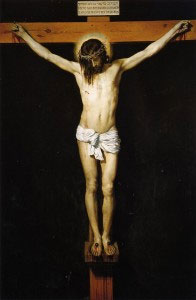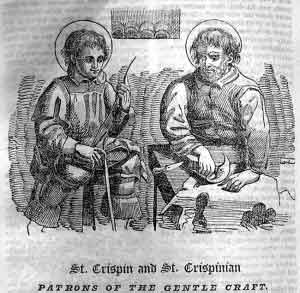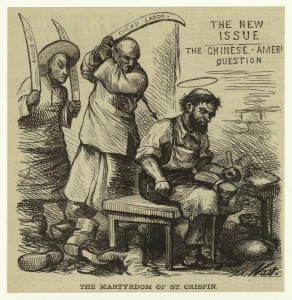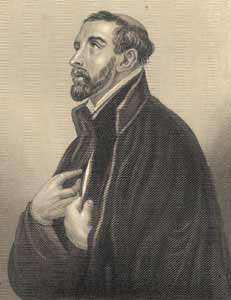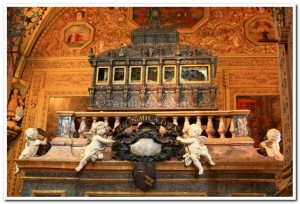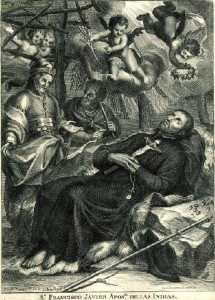Podcast: Play in new window | Download (Duration: 5:40 — 5.2MB) | Embed
Subscribe: Apple Podcasts | Spotify | Amazon Music | Android | Pandora | iHeartRadio | JioSaavn | Podchaser | Gaana | Podcast Index | Email | TuneIn | Deezer | Anghami | RSS | More
From Omar F. A. Gutierrez (found on his blog)
I cannot tell you how many times I have heard this complaint from well-meaning Catholics: “We have a 40 Days for Life and a March for Life and a Novena for Life, but why don’t the bishops get behind a 40 Days for Poverty or a March to End Poverty campaign? Why can’t the bishops give equal time to all the other life issues?” Here’s what I usually say:
1) I think it is important to agree that poverty is a life issue. Likewise, it is important to agree that addressing poverty and its many causes is part of our responsibility as Catholics. So saying things like, “Helping the poor is the business of local churches and charities and is not the work of the government” is nonsense and actually counters Catholic Social Teaching. The government does and must have a role if for no other reason than to reinforce the notion that alleviating the affects of poverty is a communal responsibility. The level of governmental involvement is debatable, but that it should be involved really isn’t.
2) But then it needs to be pointed out to the well-meaning Catholic that there is no single legislative embodiment of the perpetuation of poverty. There is no one law that exists in our land which states, “poverty is a good thing,” or “we want poor people,” or “being poor is a Constitutional necessity.” There is, however, a singular decision that has enshrined abortion on demand, a singular legal decision which has created a structure around abortion that is one of the most permissive in the entire world, a singular argument that is so legally unsound that even supporters of abortion think it is bad law. That law is Roe v. Wade, and it needs to be overturned.
Saying that poverty needs to be overturned might be a nice sound bite, but it is meaningless. There is no single legal strategy that will ever eradicate poverty, indeed, Our Lord tells us that poverty will always exist. I know many who cringe at the mention of this fact, but it is a fact, and it means only what it means. We will always have the poor with us.
3) To this many respond, “Well, we’ll always have abortion too.” Yes, that’s right, which is why the strategic goal of the U.S. Bishops is not to thwart abortions for all time. Thanks to sin, abortion will always be with us. Therefore, our goal is not to undue sin but rather to overturn legalized abortion. The goal is always to finally put an end to the legal structure that allows one class of persons to snuff out the life of another class of persons. Put otherwise, our goal is to make abortion illegal not impossible. There is no way to make it impossible, and making poverty illegal is nonsensical.
4) There is another crucial difference. We have all this public pro-life work because there are still so many Americans and even many Catholics who are convinced that abortion is okay. Though there are some who callously dismiss the plight of the poor as a punishment for their own laziness, it is nevertheless the case that expressing this opinion is roundly condemned by our culture. Everyone knows, even if they dare to think it, that blaming the poor for their poverty is asinine. It’s considered “edgy” to say so when it is said. And no one runs on a platform that says, “let the poor stay poor.” Democrats accuse Republicans of just that, but they have to infer that’s the case because no one would dare say it publicly. That’s the difference.
When was the last time you saw reps for “Catholics for Poverty” on TV?
We do have Catholics, on the other hand, who think that abortion is alright. There are even Catholic University professors who teach that abortion can be a moral act. Heck, we have an entire political party dedicated not just to keeping abortion legal but to making sure it’s free for whoever wants one, along with Catholics who vote for candidates who publicly say “abortion is a Constitutional right” and “I don’t want my daughters punished with a child.”
5) Also, by defending the rights of the unborn, the bishops actually are advocating for the poor. The effort to help the poor will always fail so long as Americans continue to think that the life of the unborn child is expendable. The popes have said repeatedly, in all sorts of different ways, that a legal structure and a culture that rejects the life of the unborn innocent cannot hope to achieve a social justice that will honestly address the needs of the poor. The rights to labor, a just wage, education, health care, family and the rest are all “false and illusory,” to quote John Paul the Great, if the right to life is not defended to the maximum.
6) The truth is that the bishops’ do advocate for the poor, here and abroad. On state levels and at the national, they do advocate for those policy decisions that help the poor. Now, I don’t always agree with them on what helps the poor and what doesn’t, but they are far from silent about it. We could probably be reminded more often about our own responsibilities. No doubt there are a few prelates here or there who could take a cue from Pope Francis and give up the “trappings” of the ecclesial machine. Certainly, Catholics with means (even myself – as meager as my means are) could be more generous with our donations to fund poverty relief, especially those which address the root causes of poverty and build up family life.
But while all that may be true, abortion is singularly odious because of the laws that protect it and because of a culture that defends it. God bless all those who work for life . We need more of them, and we need more Catholics who love the poor to get behind the pro-life movement and to stop supporting candidates who perpetuate this genocide.
Omar F. A. Guiterrez, M.A. , Special Assistant to Archbishop George Lucas of the Archdiocese of Omaha. He’s also the author of “The Urging of Christ’s Love: The Saints and The Social Teaching of the Catholic”







